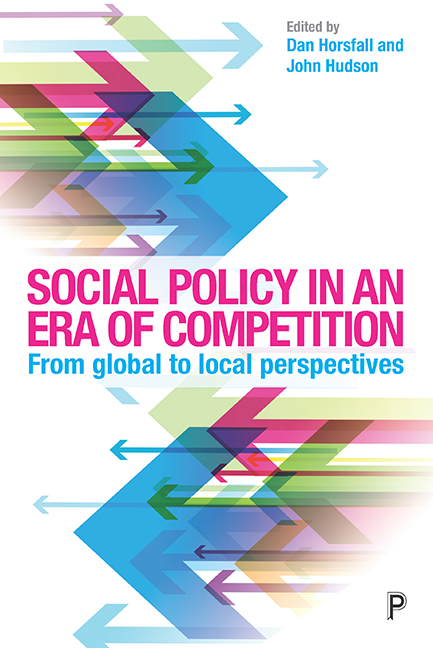Book contents
- Frontmatter
- Contents
- List of figures, tables and boxes
- List of contributors
- List of abbreviations
- Introduction: social policy in an era of competition
- Part One Global competition as the context for welfare
- Part Two The impact of intensifed competition on local governance
- Part Three The reframing of welfare discourses in an era of competition
- Part Four Conclusions
- References
- Index
Introduction: social policy in an era of competition
Published online by Cambridge University Press: 05 April 2022
- Frontmatter
- Contents
- List of figures, tables and boxes
- List of contributors
- List of abbreviations
- Introduction: social policy in an era of competition
- Part One Global competition as the context for welfare
- Part Two The impact of intensifed competition on local governance
- Part Three The reframing of welfare discourses in an era of competition
- Part Four Conclusions
- References
- Index
Summary
The competition state thesis and beyond
A quarter of a century ago Cerny (1990) outlined his ‘competition state thesis’, in which he suggested that neoliberal reform agendas, gaining traction because of the intensification of global economic competition, were sounding the death knell of the welfare state and the birth of the ‘competition state’, in which social policy is subjugated to the needs of economic competitiveness (Cerny, 1990; 1997; Cerny and Evans, 1999). With the benefit of hindsight we can say that Cerny’s claim exaggerated the threat to the welfare state, but few dispute the central idea that welfare states across the Organisation for Economic Co-operation and Development (OECD) have been subjected to reform agendas that have stressed economic competitiveness (Horsfall, 2010).
Indeed, there is an increasing consensus that welfare states have been recalibrated and restructured in significant ways, with many arguing that neoliberal competition imperatives have permeated the fabric of welfare state institutions and altered perceptions of social rights (Bonoli and Natali, 2012). However, contributions to this debate are scattered across a wide range of literatures and, moreover, overlapping arguments in different disciplines are too often debated in isolation. This text fuses key insights from theoretical political economy, macrosociology and empirical social policy analysis in order to shed new light on the ways in which global competition is reshaping welfare states in practice. Moreover, it does so from a cross-national and international perspective, on the basis that contemporary welfare reform processes must be located in a broader global context in order to be fully understood.
Much of Cerny’s work on the competition state thesis was completed while he was based in the Department of Politics at the University of York between 1970 and 1995 and/or in collaboration with Mark Evans who was based in the same department from 1993 to 2009, eight of those years as its Head of Department. Their key works on the ‘competition state thesis’ have triggered international debates of some significance; for instance, Google Scholar records over 1,000 citations for Cerny's (1997) ‘Paradoxes of the competition state’ article and around 1,000 citations for his 1990 book The Changing Architecture of Politics.
- Type
- Chapter
- Information
- Social Policy in an Era of CompetitionFrom Global to Local Perspectives, pp. 1 - 10Publisher: Bristol University PressPrint publication year: 2017

